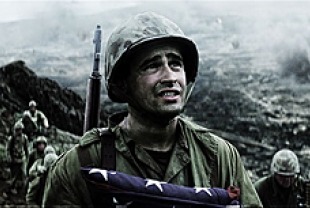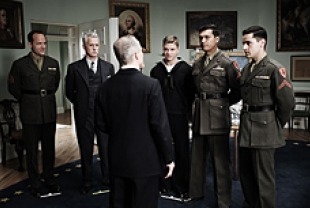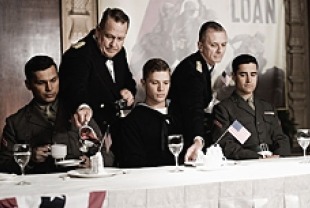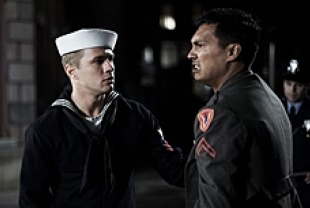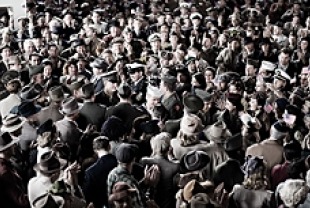The Battle of Iwo Jima was one of the bloodiest campaigns of World War II on the Pacific front. Japanese on this small rocky island were able to warn the mainland about incoming bombing raids by the Allies. On February 19, 1945, the Americans invaded, knowing that they faced more than 22,000 Japanese troops in well-fortified bunkers and caves. The 30,000 American soldiers took heavy fire as they landed on the beach; 40,000 would follow them during the month-long campaign. In the overall operation, 6,821 Americans lost their lives and 20,000 were wounded. Twenty-seven Medals of Honor were awarded for conduct in the invasion of Iwo Jima — the largest number in history for any single battle, and more than one-quarter of all those awarded during World War II.
This is the background for the events depicted in Flags of Our Fathers, an engrossing World War II film directed by Clint Eastwood based on the book by James Bradley with Ron Powers. The screenplay by William Broyles Jr. and Paul Haggis presents a multidimensional and thought-provoking examination of heroism, the political uses of photographs and soldiers, and the engines of money and power that fuel the American way of life. The drama shifts into different time zones in its look at the famous photograph by Joe Rosenthal taken on February 23, 1945 when five Marines and one Navy Corpsman raised the U.S. flag on Mount Suribachi on Iwo Jima.
Some media savvy and shrewd politicians in Washington, D.C., are quick to sense the amazing emotional reaction of the American public to the photograph. By this time, the American public was tired of war, and the defense department was almost broke. The right picture, they realized, could turn this all around. The six Americans who hoisted the flat on Iwo Jima became overnight heroes, even though no faces were identifiable in the photograph. Three of the soldiers were killed shortly afterwards. The other three are brought back home for a welcome that exceeds their wildest dreams.
They are John "Doc" Bradley (Ryan Phillippe), the only Navy man in the group of Marines; Rene Gagnon (Jesse Bradford), a gregarious young man who had been the runner bringing the flag to the top of the mountain; and Ira Hayes (Adam Beach), a Native American who is the most reluctant among the three to being heralded as a hero. He views his comrades who died in Iwo Jima as the real heroes. These three men are designated as advertising props in an all-out effort by the Treasury Department to raise $14 million dollars through the sale of War Bonds. They meet Congressmen in Washington and briefly shake hands with President Truman. Gagnon's fiancée arrives and joins the tour, while Hayes attempts to drown his war nightnares in booze. Bradley, the most quiet-spoken of the three, tries to hold things together as the trip to New York City and then an appearance in Soldier's Field become increasingly garish and absurd. At one dnner, they are served an ice cream model of them raising the Flag with strawberry sauce dripping over their bodies like blood.
Director Clint Eastwood almost matches the adrenaline-pumping D-Day invasion in Steven Spielberg's Saving Private Ryan with his bloody depiction of the American invasion of Iwo Jima. He draws out two memorable performances from Ryan Phillippe as the Doc, and Barry Pepper as the gutsy sergeant who demonstrates true leadership ability on the field of combat. But the heart and soul of the story is housed in the intense and affecting performance of Adam Beach as Ira Hayes. This Native American actor, who was in Smoke Signals and Windtalkers, conveys this soldier's conflicted feelings about the War Bonds tour. It doesn't help that everywhere he goes he is called "Chief." On one stop, he is denied access to a bar because the owners refuse to serve Indians. The fate of Hayes after the war ended is quite sad as is the story of what happened to the enthusiastic Gagnon, who was convinced that he would reap the harvest of his celebrity status after the war with a great job.
The movie's meditation on heroism comes at us from many directions, and it all comes down to this: soldiers die in battle not for their country but for their friends. The mechanics and the barbarity of war leave little room for the ancient ideals of honor and nobility in combat. Men doing their duty in the pitch of danger and death may indeed qualify as heroism, but their accomplishments are still diminished when they are exploited by politicians and media to sell war and exaggerated stories about battle. Veterans have enough to deal with besides the expectation that they will collude in tales of victory and lies about how well things are going. Eastwood's Flags of Our Fathers coveys all of this and more in a movie that delivers the goods dramatically and compels us all to rethink our ideas about heroism in war.
